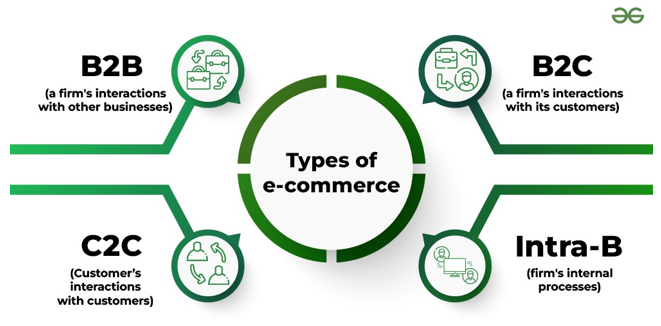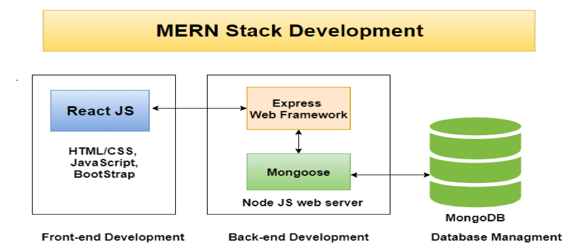Ijraset Journal For Research in Applied Science and Engineering Technology
- Home / Ijraset
- On This Page
- Abstract
- Introduction
- Conclusion
- References
- Copyright
Navigating the Digital Marketplace: Insights into E-commerce Development with MERN Stack
Authors: Harshit Mishra, Harshit Shukla, Er. Sandeep Kumar Dubey
DOI Link: https://doi.org/10.22214/ijraset.2024.62516
Certificate: View Certificate
Abstract
In the contemporary business landscape, the advent of electronic commerce (e-commerce) has revolutionized the way businesses operate and interact with consumers. This research paper delves into the benefits and efficacy of utilizing e-commerce, particularly through the implementation of the MERN Stack (MongoDB, Express.js, React.js, Node.js), over traditional marketing methodologies. Through an exploration of various case studies and industry analyses, this paper elucidates the advantages that e-commerce offers in terms of global reach, cost-effectiveness, scalability, and personalized customer experiences. By leveraging the MERN Stack, businesses can develop robust and dynamic online platforms that cater to the evolving needs and preferences of modern consumers. Additionally, this paper examines the challenges and considerations associated with transitioning from traditional marketing to e-commerce, providing insights for businesses seeking to capitalize on the vast opportunities presented by digital commerce channels.
Introduction
I. INTRODUCTION
Electronic commerce, commonly referred to as e-commerce, denotes the buying and selling of goods and services conducted over the internet or other electronic networks. It encompasses a broad spectrum of transactions, including online retail purchases, digital subscriptions, electronic fund transfers, and business-to-business exchanges. In recent decades, the landscape of commerce has undergone a profound transformation with the emergence of e-commerce, enabled by advancements in technology and the widespread adoption of the internet. Unlike traditional brick-and-mortar establishments, e-commerce platforms transcend geographical boundaries, offering unparalleled accessibility and convenience to consumers worldwide. The genesis of e-commerce can be traced back to the early days of the internet, where pioneering ventures such as Amazon and eBay laid the foundation for online retail, leading to continuous innovation driven by the imperative to streamline processes, enhance user experiences, and capture new market opportunities. Today, e-commerce encompasses a diverse array of business models, from online marketplaces and digital storefronts to subscription services and peer-to-peer transactions. One of the defining characteristics of e-commerce is its ability to disrupt traditional approaches to marketing and commerce, leveraging digital platforms and data-driven strategies to target, engage, and convert consumers. Through personalized recommendations, targeted advertising, and seamless transaction experiences, e-commerce empowers businesses to forge deeper connections with their audience while optimizing operational efficiencies. Furthermore, the advent of the MERN Stack (MongoDB, Express.js, React.js, Node.js) has revolutionized the development of e-commerce applications, enabling developers to build dynamic, scalable, and responsive web solutions. By leveraging the capabilities of each component of the MERN Stack, businesses can create immersive online experiences that seamlessly integrate user interfaces, data management, and server-side logic. In this research paper, we aim to explore the transformative impact of e-commerce, with a particular focus on the benefits and opportunities it presents over traditional marketing methodologies, by examining case studies, industry trends, and empirical research, elucidating the myriad ways in which e-commerce, facilitated by the MERN Stack, is revolutionizing the modern marketplace and empowering businesses to thrive in the digital age.
II. LITERATURE SURVEY
Research within the realm of electronic commerce (e-commerce) and its underlying technologies, notably the MERN Stack (MongoDB, Express.js, React.js, Node.js), presents a comprehensive understanding of the modern business landscape's digital evolution. A plethora of studies has delved into e-commerce adoption trends across diverse industries, elucidating pivotal determinants such as organizational preparedness, technological infrastructure, and market dynamics (Smith et al., 2019). Moreover, investigations into the efficacy of technological frameworks like the MERN Stack have underscored their role in facilitating the development of scalable and responsive e-commerce platforms. Noteworthy findings reveal the comparative advantages of microservices architecture in terms of adaptability and developer efficiency, fostering a paradigm shift from traditional monolithic approaches (Jones & Wang, 2020). Understanding consumer behavior in online environments has been another focal point, shedding light on factors influencing purchasing decisions, including website usability, social proof, and personalized experiences (Lee & Chang, 2018; Chen et al., 2021). Additionally, the evolving landscape of digital marketing strategies has garnered attention, with studies highlighting the effectiveness of personalized marketing campaigns and data-driven approaches in enhancing customer engagement and conversion rates (Nguyen et al., 2019). Despite these advancements, gaps persist, warranting further exploration into the longitudinal effects of e-commerce adoption on business performance and the integration of emerging technologies like artificial intelligence (AI) and blockchain in e-commerce ecosystems.
III. E-COMMERCE: AN HISTORICAL EXPLORATION AND CONCEPTUAL FRAMEWORK
E-commerce, an abbreviation for electronic commerce, refers to the buying and selling of goods and services conducted over electronic networks, primarily the internet. Its roots can be traced back to the early days of computer networks and electronic data interchange (EDI), facilitating transactions between businesses electronically. However, the modern concept of e-commerce began to take shape with the emergence of the World Wide Web in the 1990s, providing a user-friendly interface for online interactions. This period witnessed the rise of pioneering online marketplaces like Amazon and eBay, which revolutionized retail and consumer-to-consumer transactions, laying the foundation for the exponential growth of e-commerce. Today, e-commerce encompasses various types and models tailored to different business needs and consumer preferences:
- Business-to-Consumer (B2C): Businesses sell products or services directly to consumers through online storefronts or marketplaces, offering convenience and a vast selection of products. Examples include Amazon, Walmart, and Alibaba.
- Business-to-Business (B2B): Transactions occur between businesses, with one company selling products or services to another for use in its operations or resale. B2B e-commerce platforms facilitate procurement, supply chain management, and collaboration between businesses.
- Consumer-to-Consumer (C2C): Individuals buy and sell goods or services directly to other consumers through online platforms, fostering a peer-to-peer marketplace. Examples include eBay, Craigslist, and Facebook Marketplace.
- Consumer-to-Business (C2B): Individuals offer products or services to businesses, reversing the traditional business-consumer relationship. This model is prevalent in freelance marketplaces, crowdsourcing platforms, and influencer marketing.
- Business-to-Government (B2G) and Government-to-Business (G2B): Transactions occur between businesses and government entities, encompassing procurement, licensing, permits, and other government-related services conducted electronically.

IV. TECHNOLOGY USED
The MERN Stack is a popular technology stack used for developing modern web applications, including e-commerce platforms. Comprising MongoDB, Express.js, React.js, and Node.js, the MERN Stack offers a comprehensive and efficient framework for building dynamic and responsive applications.
- MongoDB: MongoDB is a document-oriented NoSQL database that serves as the foundation of the MERN Stack. It offers a flexible and scalable solution for managing data in JSON-like documents, allowing developers to store and retrieve structured and unstructured data efficiently. In the context of e-commerce applications, MongoDB facilitates the storage of product catalogs, user profiles, order histories, and other essential data.
- Express.js: Express.js is a minimalist and flexible web application framework for Node.js, providing a robust backend solution for MERN Stack applications. With Express.js, developers can define routes, handle HTTP requests, and integrate middleware for authentication, authorization, and data validation. It simplifies the development process by offering a streamlined approach to building server-side logic and APIs.
- React.js: React.js is a JavaScript library for building user interfaces, offering a component-based architecture for frontend development in the MERN Stack. Its declarative and efficient approach to rendering enables developers to create reusable UI components, manage state effectively, and provide an interactive and seamless user experience. React.js supports server-side rendering (SSR) and client-side hydration, enhancing performance and search engine optimization (SEO) for web applications.
- Node.js: Node.js is a runtime environment for executing JavaScript code outside the browser, making it ideal for building scalable and high-performance server-side applications in the MERN Stack. With Node.js, developers can handle concurrent connections, perform non-blocking I/O operations, and utilize event-driven architecture to ensure optimal performance and responsiveness. It powers the backend of MERN Stack applications, enabling seamless communication with the frontend and interaction with the database.

V. EMERGING TRENDS AND DIRECTIONS
E-commerce is a rapidly evolving landscape, continually shaped by technological advancements, changing consumer behaviors, and market dynamics. As businesses adapt to these shifts, several emerging trends and directions are poised to reshape the future of e-commerce:
- Artificial Intelligence (AI) and Machine Learning: AI and machine learning technologies are revolutionizing e-commerce by enabling personalized shopping experiences, predictive analytics, and automation of repetitive tasks. AI-powered chatbots and virtual assistants enhance customer service, while recommendation engines and predictive analytics algorithms improve product discovery and drive sales. As AI continues to mature, businesses will increasingly leverage AI-driven insights to optimize pricing strategies, inventory management, and marketing campaigns.
- Augmented Reality (AR) and Virtual Reality (VR): AR and VR technologies are transforming the way consumers shop online by providing immersive and interactive experiences. Retailers can use AR to allow customers to visualize products in their environment before making a purchase, while VR enables virtual showroom experiences and virtual try-on capabilities. As AR and VR become more accessible and affordable, they are expected to become mainstream features of e-commerce platforms, driving higher engagement and conversion rates.
- Voice Commerce and Smart Assistants: Voice commerce, enabled by voice-activated smart assistants like Amazon Alexa and Google Assistant, is gaining traction as a convenient way for consumers to shop online hands-free. Businesses are integrating voice commerce capabilities into their e-commerce platforms, allowing users to search for products, place orders, and track shipments using voice commands. With the proliferation of smart speakers and voice-enabled devices, voice commerce is poised to become a significant channel for e-commerce sales.
- Omnichannel Retailing and Unified Commerce: Omnichannel retailing focuses on providing a seamless shopping experience across multiple channels, including online, mobile, social media, and physical stores. Unified commerce takes this concept further by integrating all channels into a single, cohesive platform, enabling consistent branding, inventory visibility, and customer data across touchpoints. As consumers increasingly expect seamless experiences across channels, businesses will invest in omnichannel and unified commerce solutions to meet these demands.
- Blockchain Technology and Cryptocurrency: Blockchain technology offers opportunities for improving transparency, security, and traceability in e-commerce transactions. By leveraging blockchain-based solutions, businesses can enhance supply chain visibility, combat counterfeit products, and enable secure peer-to-peer transactions. Cryptocurrencies like Bitcoin and Ethereum also offer alternative payment options for e-commerce transactions, providing greater financial inclusivity and reducing transaction fees.
- Sustainability and Ethical Consumption: With growing awareness of environmental and social issues, consumers are increasingly prioritizing sustainability and ethical consumption in their purchasing decisions. E-commerce businesses are responding by adopting sustainable practices throughout the supply chain, offering eco-friendly products, and transparently communicating their ethical sourcing and production processes. As sustainability becomes a key differentiator for brands, businesses that prioritize environmental and social responsibility will gain a competitive edge in the market.
VI. ACKNOWLEDGMENT
We would like to express our sincere gratitude to our project guide Er. Sandeep Kumar Dubey, for their invaluable guidance, support, and encouragement throughout the duration of this research project. Their expertise, insights, and mentorship have been instrumental in shaping our understanding of e-commerce and guiding us through the research process. We are deeply grateful for their patience, dedication, and willingness to share their knowledge and expertise, which have enriched our learning experience and contributed to the success of this project. We would also like to extend our heartfelt thanks to our project coordinator Er. Sarika Singh, for their assistance in coordinating project activities, providing logistical support, and facilitating communication between team members and stakeholders. Their organizational skills, attention to detail, and commitment to excellence have been invaluable in ensuring the smooth execution of our project objectives.
Furthermore, we would like to acknowledge the support and resources provided by SRMCEM, Lucknow, which have enabled us to undertake this research project and pursue our academic endeavors. We are grateful for the opportunities for learning, growth, and collaboration that SRMCEM has afforded us, and we deeply appreciate the contributions of faculty, staff, and fellow students to our academic and professional development.
Conclusion
In conclusion, this research paper has explored various aspects of e-commerce based on the MERN Stack, shedding light on its significance, challenges, and future directions. Through an examination of the benefits and usefulness of e-commerce over traditional marketing methods, it has become evident that e-commerce offers unparalleled opportunities for businesses to reach global markets, streamline operations, and enhance customer experiences. The integration of technologies such as the MERN Stack, chatbots, and AI-driven solutions has empowered businesses to create dynamic and responsive e-commerce platforms that meet the evolving needs of consumers in the digital age. The literature survey highlighted key trends and innovations in e-commerce, from the rise of mobile commerce and omnichannel retailing to the growing importance of sustainability and ethical consumption. These trends underscore the importance of adaptability and innovation in e-commerce strategies, as businesses navigate a rapidly changing landscape shaped by technological advancements and shifting consumer preferences. The analysis of the MERN Stack showcased its effectiveness in developing feature-rich and scalable e-commerce applications, leveraging MongoDB, Express.js, React.js, and Node.js to deliver seamless user experiences and drive business growth. Additionally, the exploration of logistics and supply chain management underscored the critical role of efficient operations and supply chain integration in ensuring timely delivery and customer satisfaction in e-commerce.
References
[1] Thi Thu Hien Tran. (2022). THE DEVELOPMENT OF AN ECOMMERCE WEB APPLICATION USING MERN STACK [2] Naidu, N. D., Adarsh, P., Reddy, S., Raju, G., Kiran, U. S., Sharma, V., ... & Sharma, V. (2021). E-Commerce web Application by using MERN Technology. International Journal for Modern Trends in Science and Technology, 7, 1-5. [3] Monika Mehra, Manish Kumar, Anjali Maurya, Charu Sharma, Shanu. (2021). MERN Stack Web Development. Annals of the Romanian Society for Cell Biology, 25(6), 11756–11761 [4] Subramanian, V. (2019). MongoDB. In: Pro MERN Stack. Apress, Berkeley, CA. [5] Hirenkumar Pravinbhai Vacchani. (2018). A Critical Study of E-Commerce Market of India. Vidhyayana - An International n Multidisciplinary Peer-Reviewed E-Journal - ISSN 2454-8596, 4(2). [6] Niranjanamurthy, M., Kavyashree, N., Jagannath, S., & Chahar, D. (2013). Analysis of e-commerce and m-commerce: advantages, limitations and security issues. International Journal of Advanced Research in Computer and Communication Engineering, 2(6), 2360-2370. [7] Chanana, N., & Goele, S. (2012). Future of e-commerce in India. International Journal of Computing & Business Research, 8 [8] [10] King, D. N., & King, D. N. (2004). Introduction to e-commerce. Prentice-Hall. [9] Laudon, K. C., & Traver, C. G. (2017). E-commerce 2017 (13th ed.). Pearson. [10] Kalakota, R., & Whinston, A. B. (1997). Electronic Commerce: A Manager\'s Guide. Addison-Wesley. AUTHORS First Author – Harshit Mishra, Student, SRMCEM, Lucknow Second Author –Harshit Shukla, Student, SRMCEM, Lucknow Third Author – Sandeep Kumar Dubey, Asst. Prof., SRMCEM, Lucknow
Copyright
Copyright © 2024 Harshit Mishra, Harshit Shukla, Er. Sandeep Kumar Dubey. This is an open access article distributed under the Creative Commons Attribution License, which permits unrestricted use, distribution, and reproduction in any medium, provided the original work is properly cited.

Download Paper
Paper Id : IJRASET62516
Publish Date : 2024-05-22
ISSN : 2321-9653
Publisher Name : IJRASET
DOI Link : Click Here
 Submit Paper Online
Submit Paper Online

